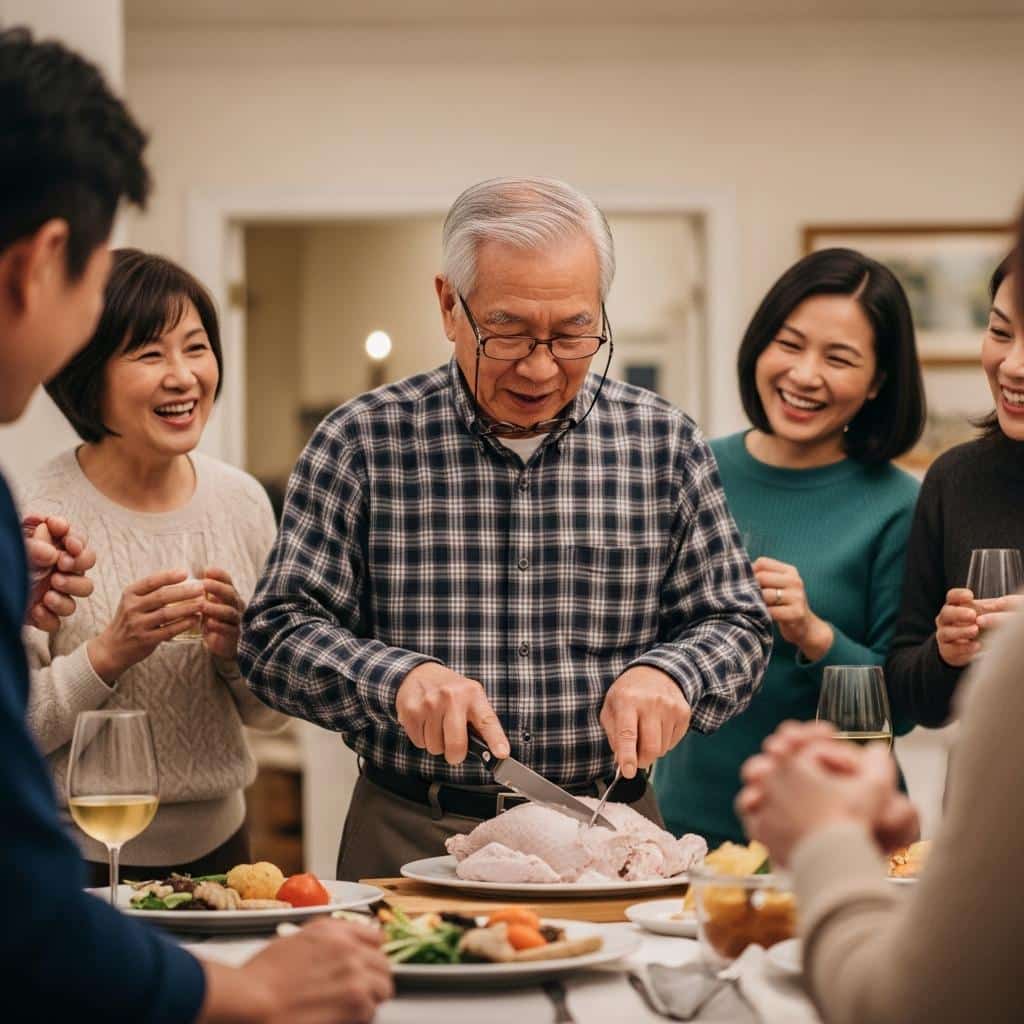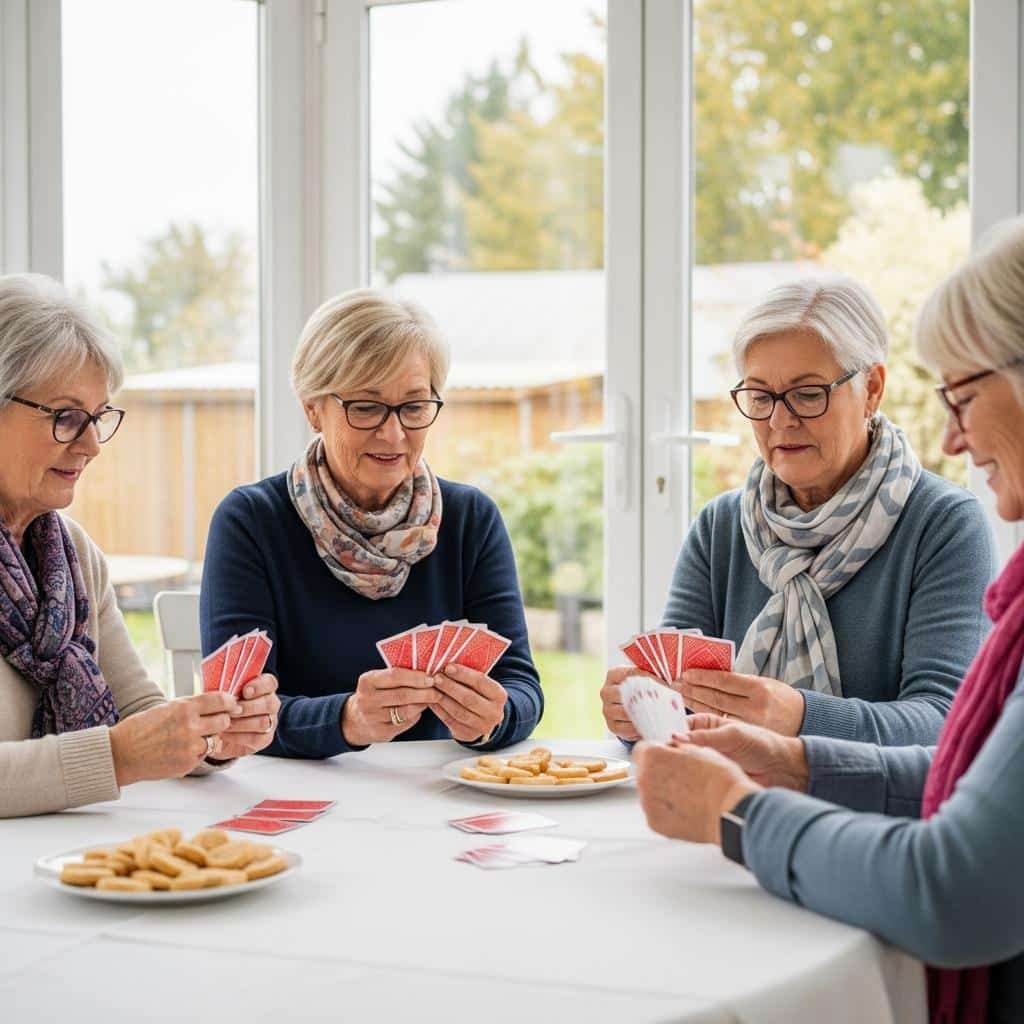Picture this Thanksgiving: no exhausting travel, no navigating complicated family dynamics, no feeling like a guest in someone else’s home.
Instead, you’re gathered around a table with people who genuinely enjoy your company, laughing over a potluck meal that nobody stressed themselves to create.
This is Friendsgiving—and it’s not just for millennials anymore. A quiet revolution is happening, and it might be exactly what you’ve been wishing for but felt guilty about wanting.
Here’s the surprising truth: More seniors are choosing to spend major holidays with friends instead of family, and they’re discovering something unexpected—it’s often MORE meaningful, not less.
Maybe you’ve thought about it. Maybe you’ve felt a twinge of guilt for even considering it. Society tells us we “should” spend holidays with family, but who says?
What if wanting holidays that genuinely bring you joy—rather than obligation, stress, or exhaustion—isn’t selfish at all?
What if it’s actually one of the healthiest choices you could make?
This isn’t about rejecting family or admitting loneliness. It’s about something far more empowering: designing holidays that actually serve you in this season of your life.

Why Seniors Are Choosing Friends Over Family (And Why That’s Actually Healthy)
Let’s be honest about modern family dynamics.
Your adult children probably live across the country. Traveling for holidays becomes physically harder with each passing year—the long flights, the airport chaos, the disruption to your routine. It’s exhausting, and if you’re on a fixed income, it’s expensive too.
And here’s what nobody talks about: not all families are close or functional.
Old wounds don’t magically heal because it’s Thanksgiving. Some family gatherings create more stress than joy. Political differences create tension. Complicated divorce situations mean awkward logistics. Being widowed changes your position in the family hierarchy entirely.
For many seniors, the traditional family Thanksgiving means feeling like a guest rather than a host—adapting to someone else’s home, someone else’s traditions, someone else’s schedule. You’ve spent decades creating your own holiday rituals, and suddenly you’re expected to fit into theirs.
Friends, on the other hand, offer something different entirely.
You chose your friends. You share values, interests, and a sense of humor. There’s no baggage, no obligation, no guilt—just genuine enjoyment of each other’s company. The conversations flow naturally because you’re at the same life stage, facing similar experiences.
Research suggests that friendships become increasingly important to one’s happiness and health across the lifespan, sometimes even more so than family relationships, indicating that senior Friendsgiving can be MORE meaningful, not less.
The practical advantages are real too. While many adult children live within 30 miles of their parents, a significant portion, such as one-quarter of adults, live more than 150 miles from their mothers, with some distances exceeding 300 miles, making travel a logistical challenge for many aging parents who want to see their adult children probably live far away.
There’s flexibility in timing and format. Responsibilities feel fair because they’re shared willingly. Most importantly, everyone’s there because they genuinely want to be—not because they feel they have to be.
Over the years, these friends have become your chosen family. They’re the people who show up for you consistently, who understand your life, who care about you not because of blood relation but because of genuine connection.
Here’s your permission statement: Choosing to spend holidays with friends doesn’t mean you don’t love your family. It means you’re prioritizing relationships that genuinely nourish you—and there’s absolutely nothing wrong with that.
This isn’t about rejecting family. It’s about embracing authentic connection and creating holidays that bring actual joy rather than stress or obligation.
Ready to discover more innovative strategies for healthy, comfortable aging? Subscribe to our newsletter for expert-tested tips and product recommendations designed specifically for older adults.

Navigating Guilt and Family Expectations (When You Choose a Different Path)
Let’s address the elephant in the room: the guilt.
It’s real, and it’s powerful. You’ve been raised with cultural messaging that “good” people spend holidays with family. You worry about disappointing your adult children or grandchildren. You fear judgment from others. You wonder what choosing differently says about you or your family.
Here’s a reality check: Your adult children have their own lives and may actually prefer the flexibility of not hosting or coordinating you. Your grandchildren often have multiple celebrations across blended families and won’t be traumatized by seeing you at a different time. Quality time matters infinitely more than specific calendar dates.
You’ve spent decades prioritizing others. It’s okay to prioritize yourself now.
Having the Conversation
If your family is local but you’re choosing friends, try this approach:
“I’m planning to spend Thanksgiving with friends this year. It’s important to me to celebrate in a way that feels joyful and low-stress. I’d love to see you the weekend after for brunch to celebrate together.”
If your family is distant:
“Travel for the holidays has gotten too exhausting for me. I’m going to celebrate locally this year with friends. Let’s plan a video call on Thanksgiving Day, and I’d love to visit at a less hectic time.”
If someone asks “Are you okay?” with that worried welfare-check tone:
“I’m more than okay—I’m actually really excited about this. I love my friends, and we’re creating something special together. This isn’t about loneliness or anything being wrong. It’s about creating holidays that feel right for this stage of my life.”
Setting Boundaries
If family members express disapproval, you can say:
“I understand this isn’t what you would choose, but it’s what works for me. I’m not asking for permission—I’m letting you know what I’ve decided. I hope you can respect that.”
If there’s pressure to attend the family gathering:
“I appreciate the invitation, but I’ve made other plans that I’m looking forward to. This isn’t about you—it’s about what I need right now.”
Reframing for Yourself
When guilt arises, remind yourself:
- You’re allowed to design holidays that work for YOUR life
- Choosing joy over obligation is healthy, not selfish
- You can love your family AND choose to spend holidays differently
- Your worth isn’t measured by holiday attendance
- You’ve earned the right to make your own choices
Here’s something that might surprise you: Often, adult children are more relieved than hurt when aging parents make independent holiday plans, as it removes the pressure of hosting or coordinating complex logistics.
According to one parenting expert, adult children are often adult children are more relieved and may even be “afraid to talk to you about their desire to change the holidays.” They might be grateful that you’ve taken the decision out of their hands.
Guilt is normal, but it doesn’t mean you’re doing something wrong. You have permission to create holidays that genuinely serve you.

What Senior Friendsgiving Actually Looks Like (The Joyful Details)
The beauty of Friendsgiving is that there’s no one right way to do it.
The Traditional Dinner (With a Twist)
Imagine a potluck-style gathering where everyone contributes a dish—nothing elaborate or stressful, just whatever they enjoy making. It might be held at someone’s home or a rented community space. The menu could be completely traditional turkey and stuffing, or it could be pizza and wine. The explicit dress code? Comfortable clothes only. No fancy outfits required.
And here’s the liberating part: It doesn’t even have to be on Thursday. Your group can celebrate whenever works for everyone.
The Restaurant Celebration
Book a private room or large table and let professionals handle the cooking and cleanup. Split the cost, focus entirely on conversation and connection, and make the experience accessible for those with mobility or cooking challenges. It’s often more affordable than you’d think, and infinitely less stressful than hosting.
The Progressive Dinner
Appetizers at one home, main course at another, dessert at a third. This keeps things interesting, distributes the hosting burden, and works particularly well for groups where shorter visits at each location accommodate energy levels and mobility.
The Completely Non-Traditional Approach
Who says Thanksgiving has to look traditional? Consider brunch instead of dinner. Pizza and game night instead of turkey. A potluck breakfast followed by a gratitude circle. A movie marathon with finger foods. Or volunteer together at a local organization, then share a simple meal afterward.
The Destination Mini-Vacation
A small group travels together to a cabin, hotel, or resort. Share a new experience while celebrating. Create memories beyond just a meal. This works beautifully for active seniors who love adventure and want to combine holiday celebration with exploration.
What Makes It Special
The energy is different.
Everyone’s there by choice, not obligation. Laughter comes easily. There’s no walking on eggshells around difficult relatives. Conversations are genuine and engaged—people actually listen to each other.
The flexibility means accommodating everyone’s energy levels and abilities. Dietary restrictions are handled with understanding rather than judgment. Timing is adjusted for everyone’s comfort. The format is shaped by what the GROUP enjoys, not what tradition dictates.
The Rituals You Create
Many Friendsgiving groups develop their own traditions:
- A gratitude circle where everyone shares what they’re thankful for
- “Remember when…” story time that celebrates shared history
- Games or activities that everyone genuinely enjoys
- Toasts to friendship and chosen family
- An annual group photo that captures how you’ve grown together over the years
- Recipe exchanges
- Each person bringing something that represents who they are
The best part? The complete absence of stress. No gift expectations or obligations. No judgment about what you bring or how you contribute. No complicated seating arrangements or family politics. No pretending to be someone you’re not.
Picture a group of six friends who’ve known each other for 20+ years gathering for brunch instead of dinner—because they’re morning people and dinner feels too formal. They rotate hosting, contribute simple dishes, and spend three hours talking, laughing, and playing cards. No pressure. No performance. Just genuine connection and joy.
Or imagine five retired neighbors who book a long weekend at a nearby cabin. They share cooking duties, hike together in the morning, prepare a simple Thanksgiving meal together in the afternoon, and spend the evening by the fireplace sharing stories. It’s part celebration, part mini-vacation, all meaningful.
Senior Friendsgiving can look however you want it to look. The only requirement is that it brings you genuine joy.

How to Organize Your Own Senior Friendsgiving (Practical Getting-Started Guide)
Ready to make this happen? It’s easier than you think.
Step 1: Identify Your People
Start with friends who share your values and sense of humor. Choose people whose company you genuinely enjoy—not obligation invites. A mix of couples and singles often works well. Consider energy levels and mobility to create a compatible group.
Smaller is often better. Four to eight people creates an intimate, manageable gathering where everyone can really connect.
Test interest casually before making formal plans: “I’ve been thinking about doing Friendsgiving this year with a small group. Would that be something you’d be interested in?” Don’t oversell it—just present it as an option and see who responds enthusiastically.
Step 2: Decide on Format Together
Discuss these questions as a group:
- Location: Home, restaurant, or other venue?
- Style: Traditional dinner, brunch, or something completely different?
- Date: Actual Thanksgiving or a nearby weekend?
- Dress code: Casual and comfortable?
- Timing: How long will you gather?
- Dietary considerations for the group?
Step 3: Coordinate Logistics Simply
For home gatherings:
- Decide who hosts (or plan to rotate annually)
- Create a specific potluck list—assign categories rather than saying “bring whatever”
- Address setup and cleanup responsibilities clearly
- Plan for seating and accessibility needs
- Decide on disposable vs. real dishes (no judgment either way—choose what reduces stress)
For restaurant gatherings:
- Research restaurants with private dining or group-friendly spaces
- Make reservations well in advance
- Discuss budget expectations upfront so there are no surprises
- Clarify whether you’ll have separate checks or split evenly
- Order menu in advance if possible
Step 4: Set the Tone and Expectations
Communication is key. Be explicit about creating a low-stress, flexible vibe. Invite input from everyone. Create a shared document or group text for coordination.
Sample invitation language:
“I’d love to host a Friendsgiving this year—low-key, potluck style, focused on enjoying each other’s company. Thursday, November 28th, 2:00 PM at my place. Bring a dish to share and your sense of humor. Comfortable clothes encouraged. Who’s in?”
Step 5: Build in Meaning (Optional But Recommended)
Consider including elements that make the gathering more meaningful:
- Gratitude sharing (if your group would enjoy that)
- Time for everyone to catch up properly, not just surface chatter
- Photos to document the gathering
- A simple ritual that marks the occasion
What NOT to Do
Avoid these common pitfalls:
- Don’t over-plan or make it too formal (defeats the whole purpose)
- Don’t invite people out of obligation
- Don’t stress about perfection
- Don’t compare it to family Thanksgiving
- Don’t make it complicated
The beauty is in the simplicity. Some of the best Friendsgivings are the simplest: good food, good people, good conversation. That’s it.
You don’t need elaborate decorations, complicated recipes, or perfect execution. You need genuine connection—and that happens naturally when you’re with the right people.
For Those Nervous About Hosting
Consider these lower-barrier options:
- Suggest a restaurant gathering to remove hosting pressure entirely
- Propose going in on a catered meal
- Start with something smaller and simpler—brunch is less intimidating than dinner
- Co-host with a friend so responsibility is shared
Starting your own Friendsgiving is easier than you think. The key is keeping it simple and focusing on connection rather than perfection.
Looking for more ways to design a life that truly serves you? Join our newsletter community for practical tips on living your best life at every age.

Embracing Your Right to Joy (And Designing the Holidays You Actually Want)
This isn’t just about Thanksgiving—it’s about claiming your right to design your life in ways that genuinely serve you in this season.
You’ve earned this freedom.
You’ve spent decades meeting others’ expectations. You’ve hosted, traveled, accommodated, compromised. You’ve prioritized family, children, grandchildren. You’ve shown up even when it was hard, even when it cost you.
Now you get to prioritize authentic joy.
What This Really Represents
You’re not “settling” for friends instead of family. You’re actively choosing relationships that nourish you. You’re modeling healthy boundaries and self-care. You’re showing that aging can be about growth and liberation, not limitation and loss.
Challenge every “should” that comes up:
- “I should spend holidays with family”
- “I should feel grateful for any invitation”
- “I should prioritize grandchildren”
- “I should keep traditions exactly as they were”
Replace them with: “I choose to spend holidays in ways that bring me genuine joy and authentic connection.”
Permission to Evolve
What worked in your 40s may not work in your 70s. Traditions can evolve without being destroyed. You’re allowed to change your mind about what matters. Your needs and preferences are valid at every age.
The Ripple Effect
When you prioritize your genuine needs, something remarkable happens:
- You model healthy aging for younger generations
- You remove pressure from adult children to “take care of” your holidays
- You show your grandchildren that joy matters at every age
- You give other seniors permission to make similar choices
Looking Forward
This could be the start of something wonderful. A standing annual tradition with your friend group that gets richer each year. New rituals that feel more meaningful than old ones. Genuine holiday joy instead of holiday stress.
The Abundance Mindset
Choosing Friendsgiving doesn’t mean you lose family connection. You can see family at other times—often less stressful times when you can actually enjoy each other. Video calls can connect you on the actual holiday.
You might discover your family is relieved you’re making independent plans. You’re modeling that love isn’t measured by holiday attendance.
Here’s your final permission statement:
You don’t need anyone’s permission to spend holidays however you want—but if you need to hear it:
You are absolutely allowed to create holidays that genuinely bring you joy. You are allowed to choose friends over family. You are allowed to design new traditions. You are allowed to prioritize your own wellbeing and happiness. This isn’t selfish—it’s healthy, wise, and life-affirming.
Your Thanksgiving, Your Choice
If you’re reading this and feeling that flutter of possibility—that “maybe I could actually do this” feeling—listen to it.
You’re part of a growing movement of seniors choosing authenticity over obligation. Making this choice might feel scary or uncomfortable at first. That’s normal. Discomfort doesn’t mean you’re doing something wrong. It often means you’re doing something brave.
Joy is not selfish. Joy is essential.
This could be the best Thanksgiving you’ve had in years. The excitement you’re feeling? The nervousness mixed with hope? That’s all normal and healthy.
Even if you just start by having a conversation with a few friends to gauge interest, you’ve taken the first step toward creating something meaningful.
Here’s to friendships that feel like family. Here’s to traditions that evolve. Here’s to holidays that bring genuine joy. And here’s to seniors who are brave enough to design lives that truly serve them.
Your Friendsgiving awaits—and it’s going to be wonderful.
Have you celebrated Friendsgiving, or are you thinking about it? What would your ideal friend-centered holiday look like? Share your thoughts in the comments—let’s celebrate this revolution together!

![Senior group autumn walk cane[1]](https://www.grayingwithgrace.com/wp-content/uploads/2025/11/senior_group_autumn_walk_cane1-e1762875262861.jpg)
![Senior woman bedroom window breakfast journaling[1]](https://www.grayingwithgrace.com/wp-content/uploads/2025/12/senior_woman_bedroom_window_breakfast_journaling1-e1767122246503-450x300.jpg)
![Senior couple cold porcht thermal mugs[1]](https://www.grayingwithgrace.com/wp-content/uploads/2025/12/senior_couple_cold_porcht_thermal_mugs1-e1767121617380-450x300.jpg)
![Senior woman video call weekly checkin[1]](https://www.grayingwithgrace.com/wp-content/uploads/2025/12/senior_woman_video_call_weekly_checkin1-e1767120242595-450x300.jpg)
![Senior woman window coffee cozy[1]](https://www.grayingwithgrace.com/wp-content/uploads/2025/12/senior_woman_window_coffee_cozy1-e1767119963869-450x300.jpg)
![Older group herbal tea infusion winter social[1]](https://www.grayingwithgrace.com/wp-content/uploads/2025/12/older_group_herbal_tea_infusion_winter_social1-e1767119761234-450x300.jpg)
![Older woman sharing statement patio[1]](https://www.grayingwithgrace.com/wp-content/uploads/2025/12/older_woman_sharing_statement_patio1-e1767119298761-450x300.jpg)
![Senior woman neighbor front porch talk[1]](https://www.grayingwithgrace.com/wp-content/uploads/2025/12/senior_woman_neighbor_front_porch_talk1-e1767119127240-450x300.jpg)
![Senior woman step stool safe closet declutter[1]](https://www.grayingwithgrace.com/wp-content/uploads/2025/12/senior_woman_step_stool_safe_closet_declutter1-e1767118700445-450x300.jpg)



